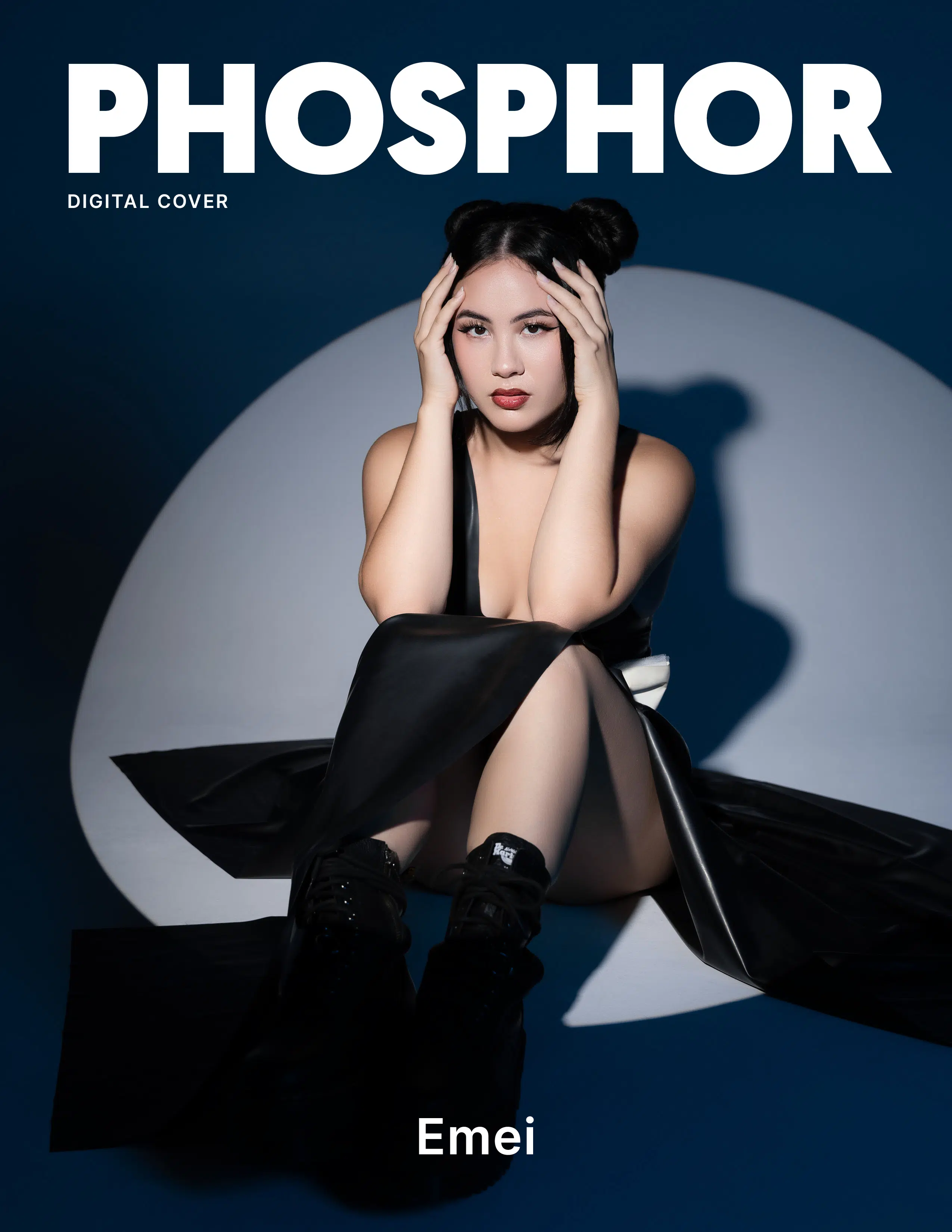
Emei on taking risks and being intentional about her art
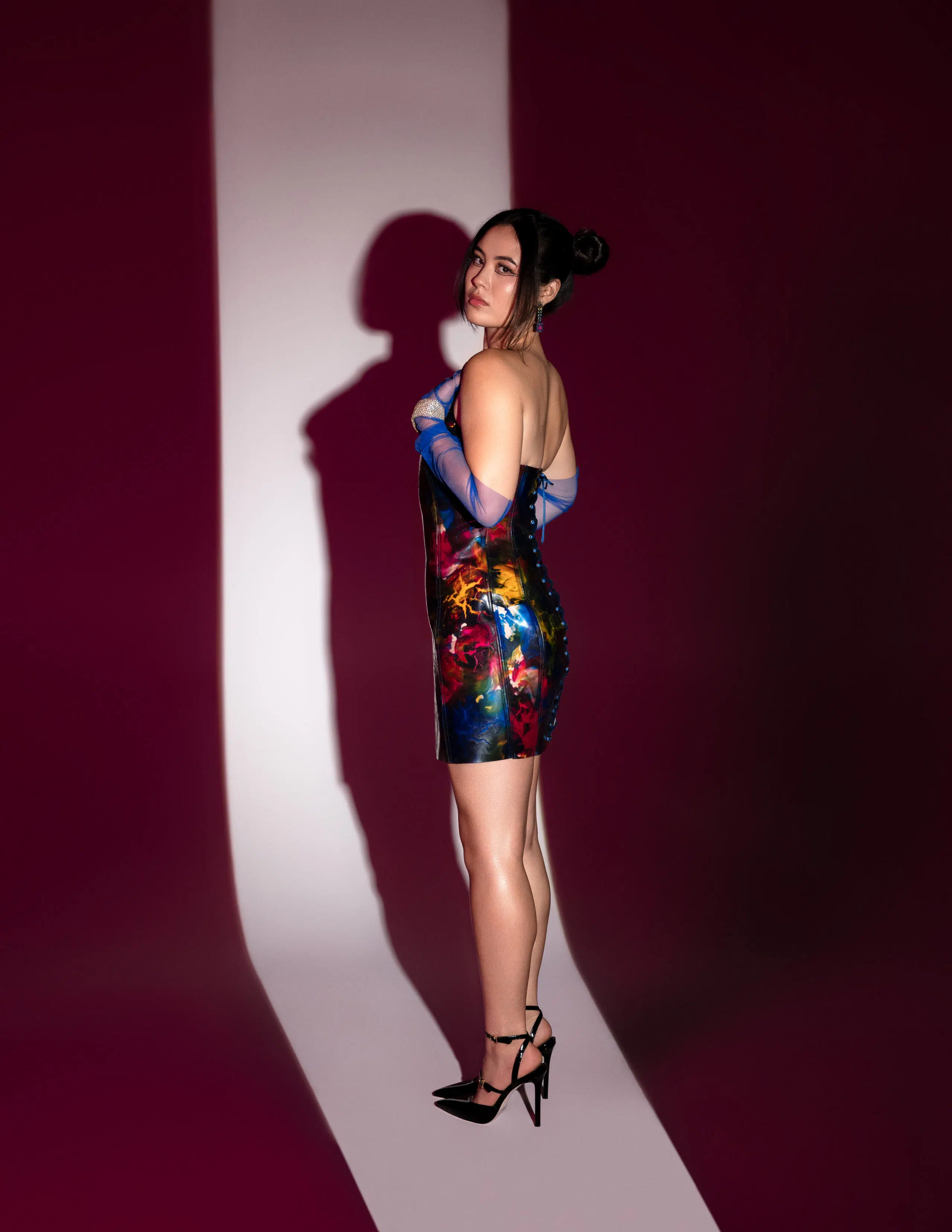
Emei reflects on becoming the person she is today and being intentional about the songs she chooses to put out. She also talks upbringing, performing on Chinese Idol, and sharing her music on social media.
Let’s start off with a fun game of Would You Rather. My first question for you is, would you rather switch lives with a person of your choosing for a week or switch lives with a random animal for a month?
[I would] definitely switch lives with a person of my choosing for a week, but I don’t know who. It would have to be someone who is on vacation and rich.
That’d be nice. I would totally agree with that.
Right? First of all, a month is so much longer. What if it’s horrible? And then it’s like, “What animal [do I choose]?” A dog could be nice, but a month is a really long time.
True. Dogs seem like they have no cares in the world, so it might be nice to be a dog for a month.
It seems very stress-free.
Your second question is, would you rather go on an adventure with a unicorn but have no memory of the adventure, or go on an adventure with a mermaid but sacrifice your voice like in The Little Mermaid movie?
[Would I have to] sacrifice [my voice] forever or just for the adventure?
That’s a good question. It says sacrifice, so let’s just say it would be forever.
Then I would definitely [choose] the unicorn. Considering my entire career is based [on] my voice, it’s probably important [that I keep it].
If you could get your voice back at the end of the adventure, would that change your answer?
[The] unicorn sounds so much more fun — it’s a colorful pony — so I would [choose] the unicorn. Even if I don’t remember it, I would still get the endorphins and dopamine spike that our adventure would provide.
Your final question is, would you rather spend a day with any historical figure of your choosing or any fictional character of your choosing?
I would automatically [choose a] fictional [character] because I’m not really a big history person [and a] fictional [character] sounds more fun. It would be really dope if I could spend a day with Hermione Granger and she could teach me magic. I would want some magic involved. [There are] lots of very fantastical options.
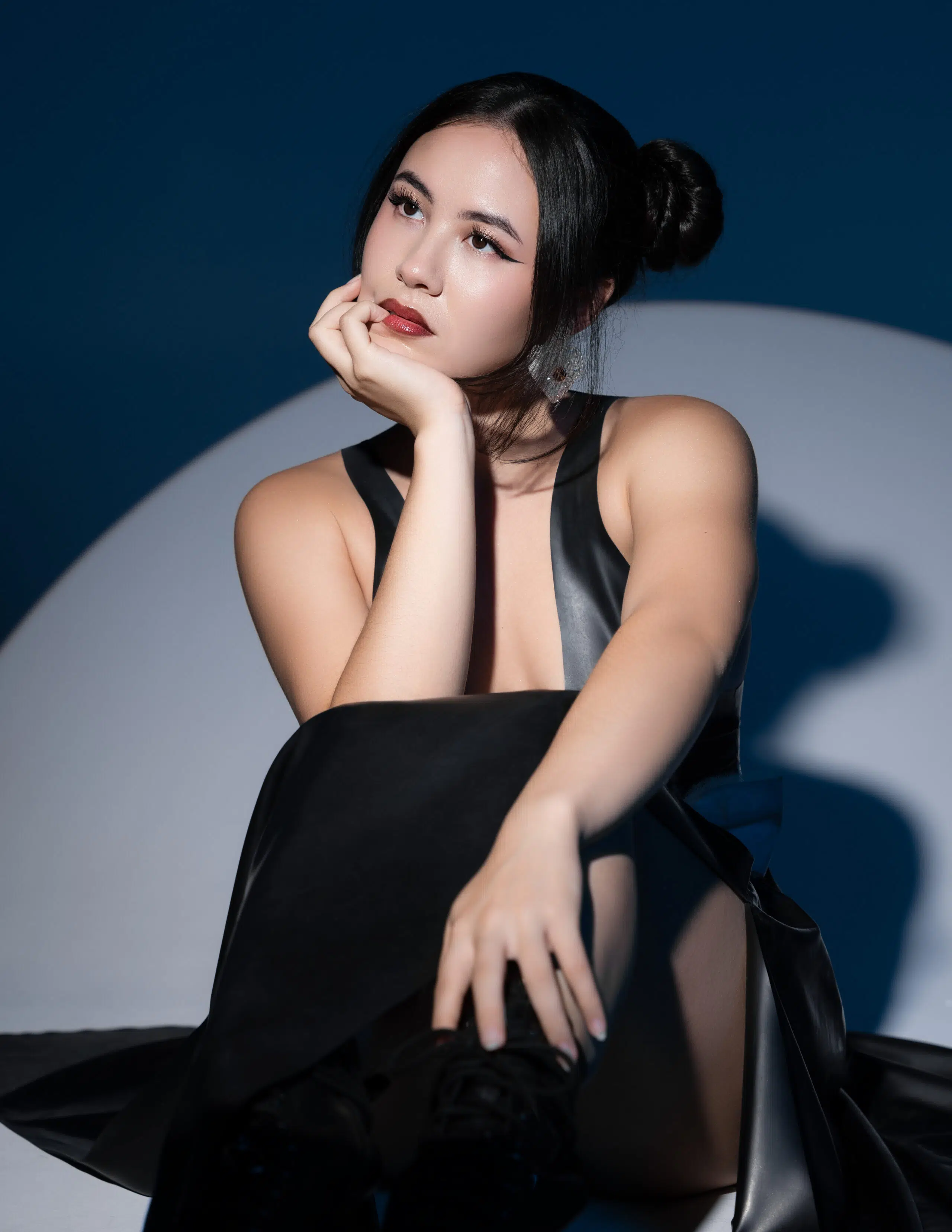
Shoes DR MARTENS, earrings YAYA.
You grew up in America for part of your life, but your parents were from China originally. You’ve stated in other interviews that your upbringing was a little stricter and more structured. Do you feel like your upbringing taught you any skills that you use in your career or daily life?
My parents are immigrants from China. They immigrated to America around 1988. Growing up was a lot of “[keep your] head down [and] work super hard.” I feel like a lot of my work ethic and nature comes from them. My parents are also very supportive. Because they sacrificed so much to come to America [so they could] have a better future for their kids, I’ve gotten more freedom to pursue music. I have [always had] their support behind me. I think the biggest thing I learned from them is to work hard. I definitely work very crazy hard. I’m a workaholic, for sure.
You majored in cognitive science in college. What sparked your interest in that subject? I feel like music is very different from cognitive science.
I got into cognitive science because I knew that I [didn’t want] to study music in college. I went to Yale, so I felt like I needed to study something that was [more] traditional [so I could have] the real college experience. I was taking a bunch of intro courses freshman year when I was choosing what to study, and when I took [an] intro to [cognitive science] class, I was like, “Yeah, this is interesting.” It was an on-a-whim decision, but I definitely enjoyed my time, and [I] learned a lot of stuff that I wouldn’t [have] normally [learned].
I don’t really know anything about cognitive science or what that entails, but what kind of career do you think you would have if you stuck with cognitive science and weren’t doing music?
Cognitive science is like psychology, neuroscience, [and] linguistics [mixed together]. It’s multi-disciplinary, which basically means that a lot of people end up doing [things] like consulting. I honestly don’t really think it matters what you major in in college. I feel like everybody ends up doing all sorts of things after [college] anyway.
Was there anything specific you wanted to do with cognitive science?
No. I was planning on doing music the whole time, so I basically chose a major specifically because I had to choose a major, and I didn’t want to study music. It was for learning things that I wouldn’t normally [be learning].
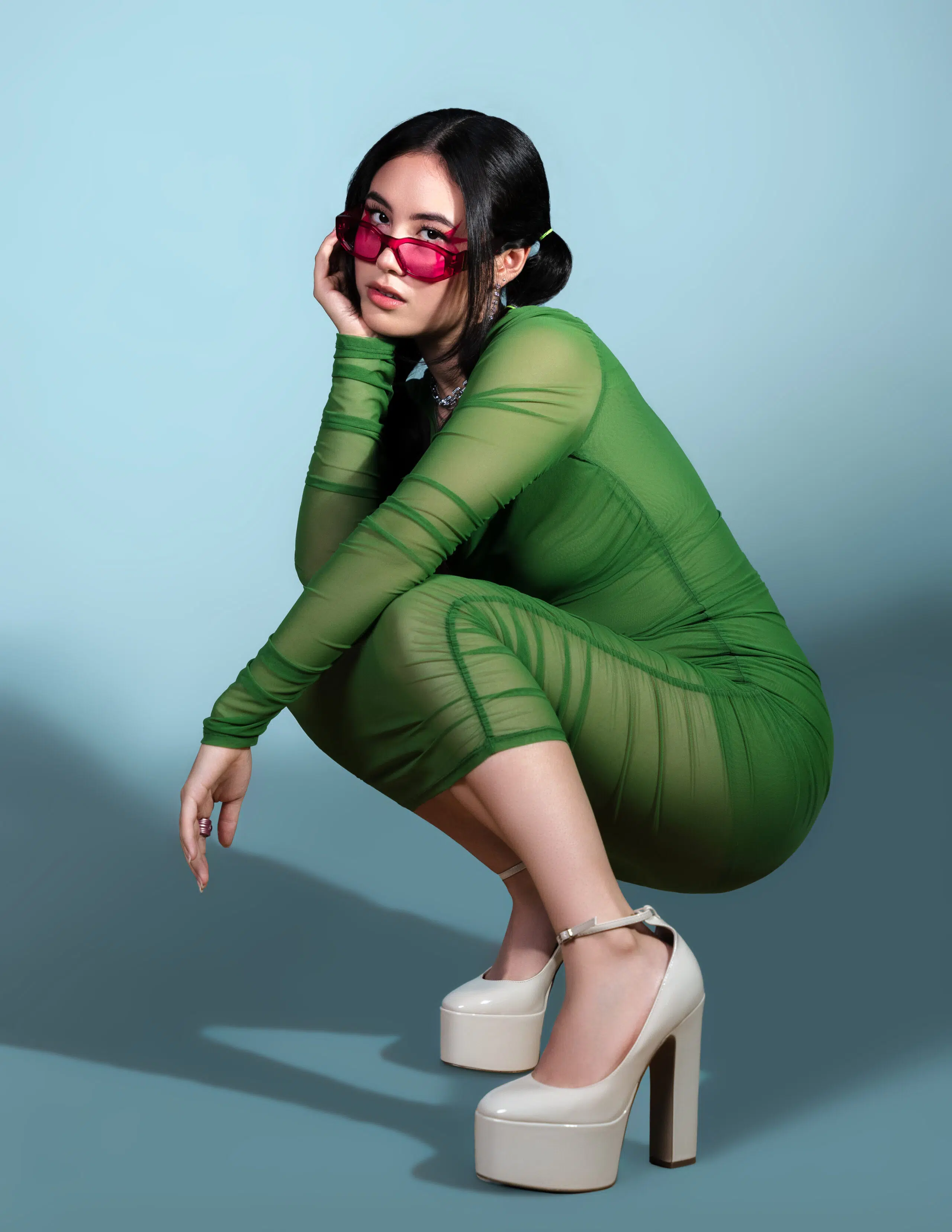
Dress RABOT, earrings POP PR, chain necklace TWENTYONEAUGUST, tennis necklace YAYA, shoes VALENTINO, sunglasses VERSACE.
I feel like every artist or musician has a moment where they realize, you know what, I want to do this as a career. What was that moment for you?
I’ve been performing since I was nine. When I was around fifteen, I took a gap year from high school and did Chinese Idol. I ended up getting third place [in] it, and [I got] signed [to] a television deal in China. That was the first time that I was [introduced to] entertainment as a career. I was young, and at the time, I wasn’t totally sold [on doing this as a career]. I felt like it was a lot of pressure, and I didn’t love it. When I came back to high school, I started writing music. Starting to express myself creatively in a songwriting format made me realize that this was what I wanted to do.
How was the Chinese Idol opportunity presented to you? I feel like in America, that’s equivalent to our American Idol.
I went to China every summer growing up because my parents are [from] there [and] my extended family is there. I was in China that summer, and I knew that I wanted to do some sort of competition because I tend to improve a lot when I’m under pressure. [At the time], Chinese Idol [was] looking for singers who [were] interested [in auditioning]. When it came up, I said, “Yeah, why not?” It was one of those things where I didn’t expect that much of it, and then it became a four-month-long endeavor. It was definitely a very intense experience, but I learned a lot from it.
How do you feel like that experience has impacted your career?
I’m much more comfortable on stage. I love performing, and it’s one of my favorite things to do, [but] I don’t think I would feel that way if I [hadn’t gone] through what was basically four months of performance boot camp when I was fifteen. I feel very lucky that I’m not stressed about the performance aspect when I’m touring.
You have had success here in America, China, and internationally as well. Would you ever want to make something creatively that blends both your Chinese and your American audience?
Oh yeah, absolutely! I’ve been playing with this idea for a while, and [I] definitely want to do it eventually. When I [make and release] my first album, I would love to have tracks that have a little bit of Chinese in them and a little bit more of an Eastern [influence]. I grew up listening to Chinese music, so I definitely want to start doing that [eventually].
You’re making music as a solo artist right now, but back when you were in college, you were in a group called Grove. I’m sure there are a lot of similarities between your solo career and being in a group, but what do you feel like are some of the differences?
[When we made that] band in college, we weren’t taking it super seriously. It wasn’t for a career [or anything like that]. We were all musicians that wanted to play and perform, and it just [so] happened that a lot of us were in the same dorm. It was very natural. [It was] like, “Oh, do you guys want to rehearse every week and play these shows for fun?” The biggest difference [between Grove and my solo project] is that [one] was for fun and [the other] I’m spending my full time [and] energy on. Being in Grove was a lot of fun. We had a lot of fun [playing] a lot of really fun basement shows. I’m very grateful for that time.

Shirt POSH, pants vintage, shoes JIMMY CHOO, necklace and multi color ring POP PR, pink ring YAYA.
TikTok and social media in general have become a really key component for musicians to build an audience and gain support. You have seen a lot of success with your music on TikTok. What do you feel like are some of the pros and cons of starting a music career on social media?
A really big pro is that it gives you the opportunity to reach a lot of listeners and [build an] audience that you otherwise wouldn’t even know how to connect with. I am selling tickets to my Europe tour right now, which is so crazy [because] I haven’t [even] been to most of the cities that I’m going to be touring in. That was because of social media.
One of the cons is that I have to post on TikTok every single day. I have to spend an hour or two every day making content and posting it. In a different time, not even [that long ago], musicians could focus on their music, performing, and being creative. [They didn’t have to] focus nonstop every single day on promotion and marketing. That definitely skews how musicians [create] their work because right now, everything is tied so strongly [to] social media. I make a TikTok, and then I go to my session. I can never just [do my] sessions without thinking about social media. Social media definitely [has its] pros and cons. I don’t know if I would even have a career [without] social media, so it’s tough to say.
Once you gain momentum on TikTok, Instagram, or another social media platform, what do you think is the most important thing for people to do to maintain that momentum?
Maintaining momentum is just maintaining output. So, [make] sure that you’re still writing all the time, [make] sure that you’re still posting TikToks, [and make] sure that you’re performing. [You] just [need to keep] maintaining whatever got you there. [Make] sure that [you continue] to do that.
Your music talks about some of the struggles you’ve faced in your early twenties, as you’re figuring out who you are and facing the expectations people may have of you. How would you describe the Emei that started performing and singing as a child versus the Emei I’m sitting here talking with right now? How have you evolved?
I started singing when I was nine. My first performance was when I was nine. I was super nervous. [When I was performing] on stage, everything about it had to be choreographed. I had to raise my hand at the fourth beat of this [specific] note. [Everything was] very choreographed, because I felt so uncomfortable on stage. I also didn’t even know that songwriting was a thing. I didn’t even know that I could create music the way that I do [now]. I feel like it was just a budding interest at the time. I was so excited about singing, and [I] knew that I loved to sing in front of people, but [I] didn’t actually know what that meant in regards to the rest of my life or [the] career I could possibly have. Now, I know a lot more. I’m excited about where everything is going, and I feel like my younger self [is] still [a part of] me. There are still moments where my inner child’s excitement comes out. For example, my North America tour is almost sold out, which is so crazy. There’s only one date left that isn’t.
Congratulations!
Thank you! Sometimes, I get caught up [in] all the stress and all the things that I have to do on a daily basis. I get stressed [and] overwhelmed, but then I remember that there are this many people who decided that they’re going to spend their [night] coming to see me sing. They’re going to spend money to get a ticket to see me sing, and singing is my favorite thing to do. [It has] been my favorite thing to do since I was nine years old. In those moments, my baby self comes back, and [I’m] like, “All these people are coming to hear [me] sing!” And then I get very emotional and very grateful.
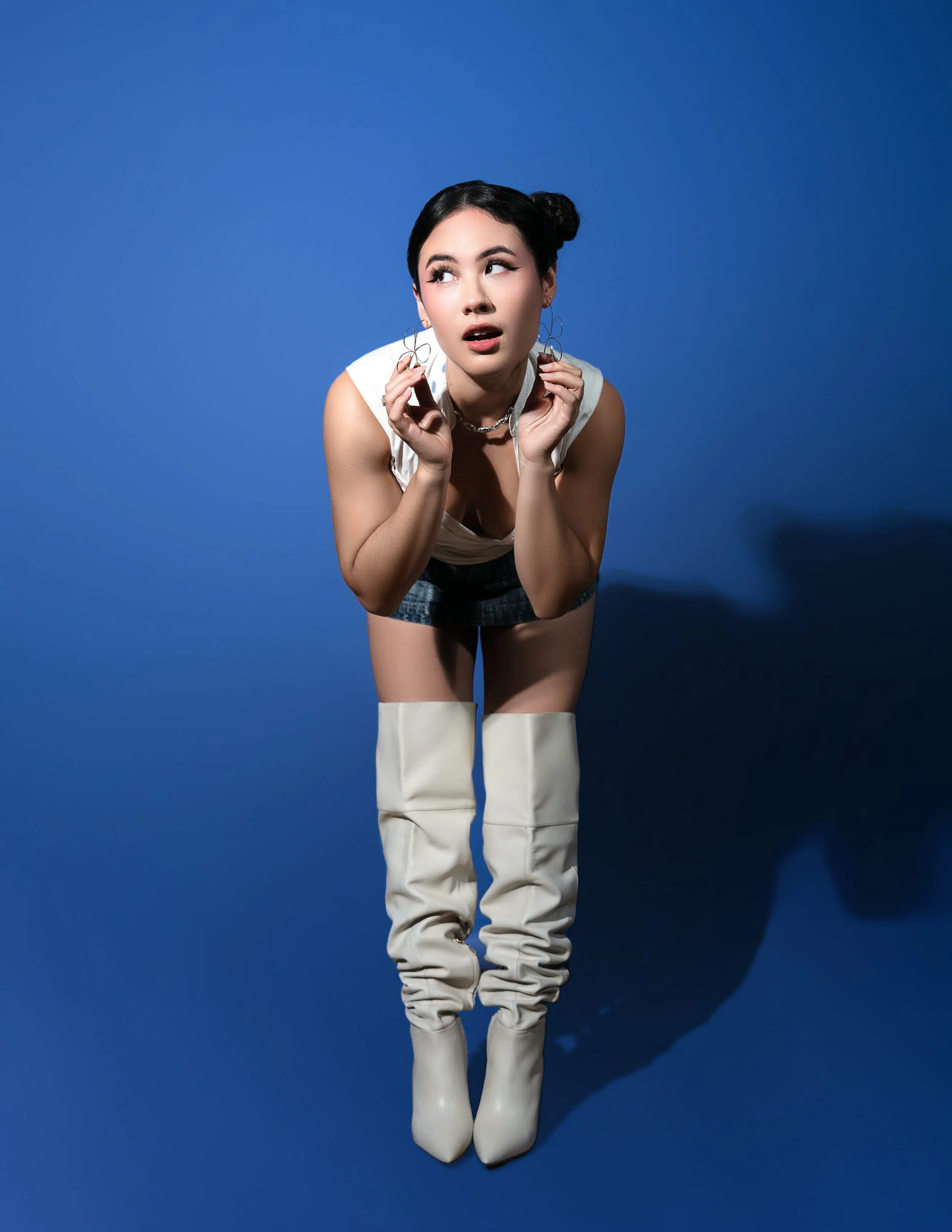
Shirt RABOT, skirt PRGATORY, shoes LARROUDE, earrings and ring POP PR, chain TWENTYONEAUGUST.
What advice would you give to other people, whether they’re teenagers or in their early twenties, who are trying to figure out what they want to do in life?
That is the time that you [should] take risks. Honestly, [that’s] how I think about your early twenties. We don’t have dependents. I don’t have children, [and] I don’t have people who depend on what I’m doing. This is the age that you should try to do absolutely everything that you want to be doing, and [you should] try to take risks. I feel like the older we get, the harder it is to do those things. [It’s harder] to go out of “the norm” [and] what is expected of you. This is the time to go for it. You [can] always have a normal, safe job and do the safe, normal things once you’re older.
That’s something a lot of people forget. I feel like there’s this societal pressure in high school or college to know everything you want to do with your life and have it all figured out right then and there. But you don’t have it figured out. It’s always better to experiment than do something you don’t want to do for thirty to fifty years of your life.
That’s the thing. I feel like people forget that life is so long. There are so many times that you can switch what you’re doing. What you’re doing right now doesn’t have to be the thing you do for the rest of your life. [You should keep] trying things until you find what you love to do, and then [you should go] for it.
In addition to your upcoming tour, you recently released a few singles. Could you share more about the creative process behind your latest single, “Don’t Know About The World”?
“Don’t Know About The World” was a really special song. It’s one of my first ballads. It’s a slower song, and it’s not as upbeat or “Boom! Boom! Boom! Boom! Boom!” like a lot of my other music is, and that was exciting to me. I love the stuff that I normally do, but this one felt more vulnerable for me. I went into the session knowing that I wanted to write something around [the lyrics], “Don’t know about the world, but I know that I love you.” There are certain people in my life where everything is worth it because I have them around me to make my life better. It was a vulnerable [and] fun session, and I love the song.
Going off what you just said, it sounds like it was a vulnerable experience to create and record that song. It has a very personal and intimate feel about it. Were there any specific topics or experiences that inspired your creative process?
I went into the session thinking, “I want to make a ballad. I’m feeling in my feels today.” I showed up and was like, “I want to write something like this.” We [were playing] around, I was talking about how lucky I am to have my best friends in my life, and then [we] went for it [and created the song].
What can fans expect from this EP compared to your previous EP?
I love this EP. I’m so proud of every single song on it. I feel like I have elevated to a certain degree. I [understand] more [of] what I want to write about and what I want to sound like. It’s a journey that you have to follow. [Obviously], the first EP is very special to me. It describes my transition from college to young adulthood. This EP is [about me] learning about myself and becoming the person that I am today. I’m super excited about it. I think all the songs are really special in their own different ways, and they create a little bit of a storyline. I’m excited for everybody to listen.
It’s always exciting when you create something and you can hear the evolution between that and the first thing you did. It’s always like, “I can’t wait for everybody to hear how much cooler this is!”
It’s very satisfying. I’m super pumped about it!
For anyone who isn’t already familiar with you or your music, what do you think is the most important thing for them to know about you and your music?
The most important thing [that people need to know about me] is that I’m obsessed with everything I put out. That is a key thing to know about me if you’re one of my listeners or [part] of my [audience]. Everything you’re listening to [is something] that I’m proud of. People tend to understand me more by listening to [my] music. I write a lot. This year, I’ve already written [close to around] eighty songs, and very few of those [will] see [or have seen] the light [of] day. I’m very, very intentional about which songs come out. That’s the thing that I want people to know [about me]. Every song is super intentional, and I hope they love my music as much as I do.
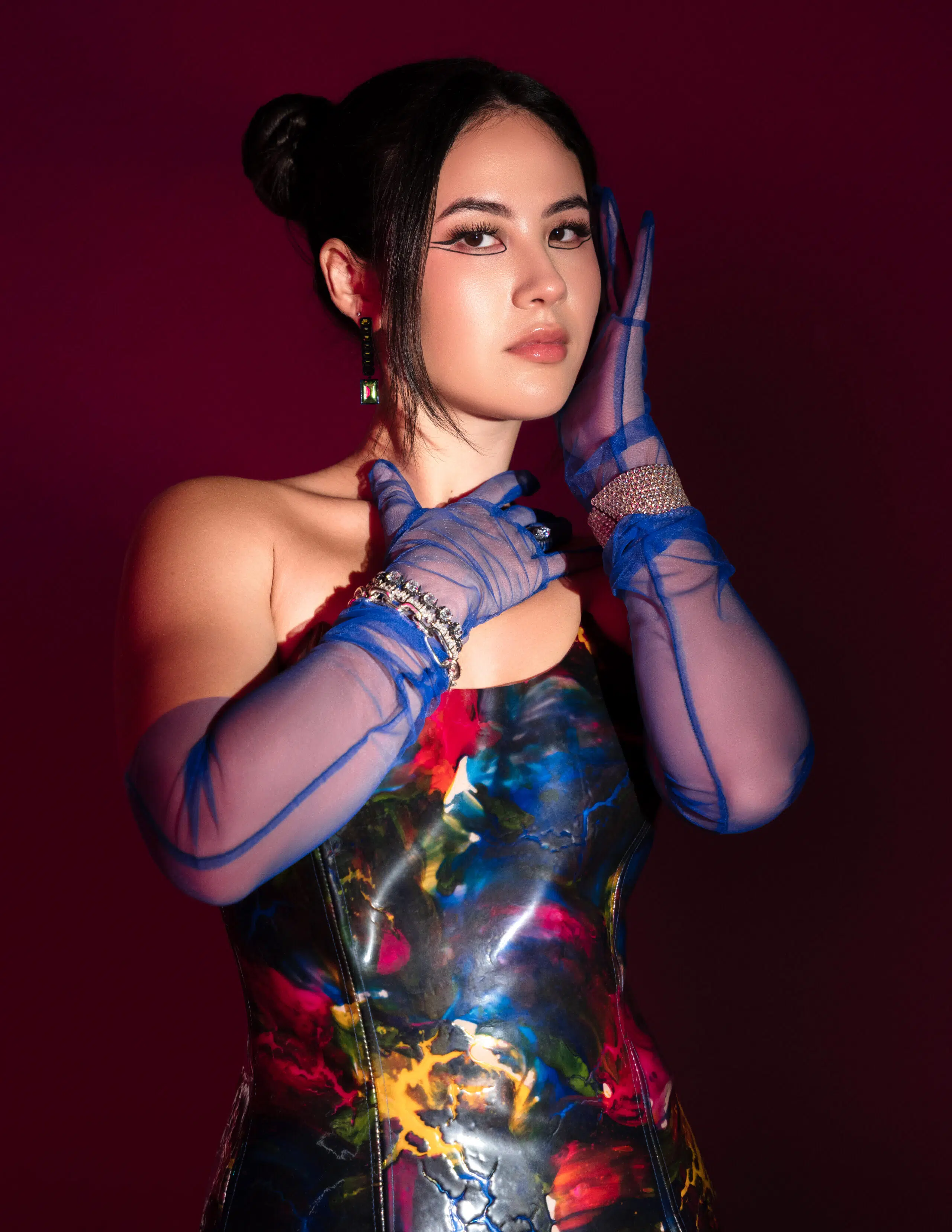
Dress NIKITA KARIZMA, shoes LARROUDE, bracelets and earrings YAYA, gloves stylist’s own.
Photography IRENE CHEN
Fashion JAIIN KANG
Glam FAYE CELESTE
Words ICEIS AUGUSTINO
Retouch MARYIA BUHAI
Location FANCY STUDIO DTLA
Special thanks to STEVE SPARROW and KERSHONA MAYO
You may also like
Raegan Revord on writing her next chapter
After seven years playing Missy Cooper on Young Sheldon, Raegan Revord reflects on saying goodbye to

Maisie Peters at Emo’s Austin
Photography IRENE CHEN Maisie Peters at Emo’s Austin on October 4, 2023 — The Good Witch Com
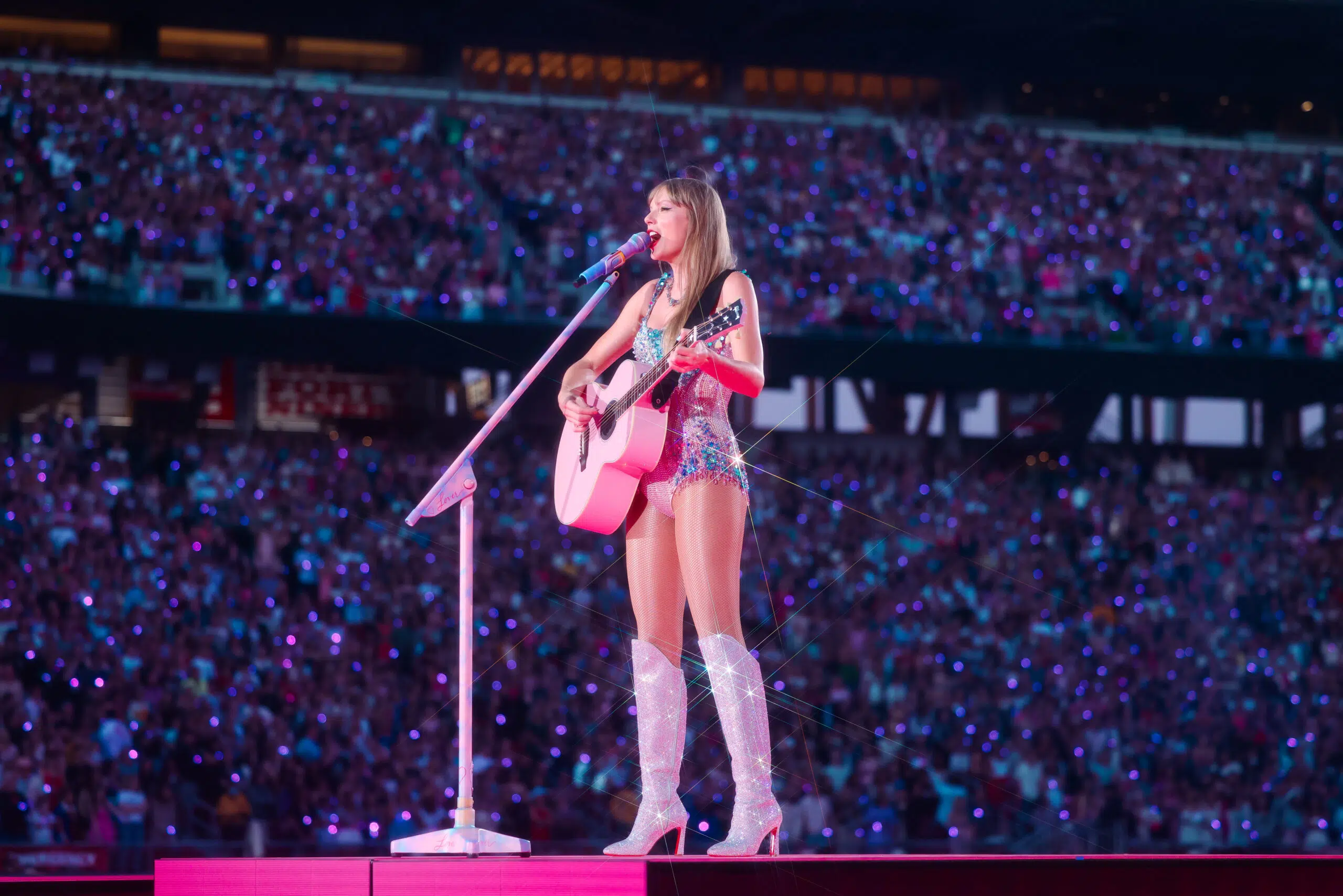
Taylor Swift shines like fireworks over Levi’s Stadium (literally!)
“How’d we end up on the floor anyway” were the lyrics I continued to sing to myself as we ente

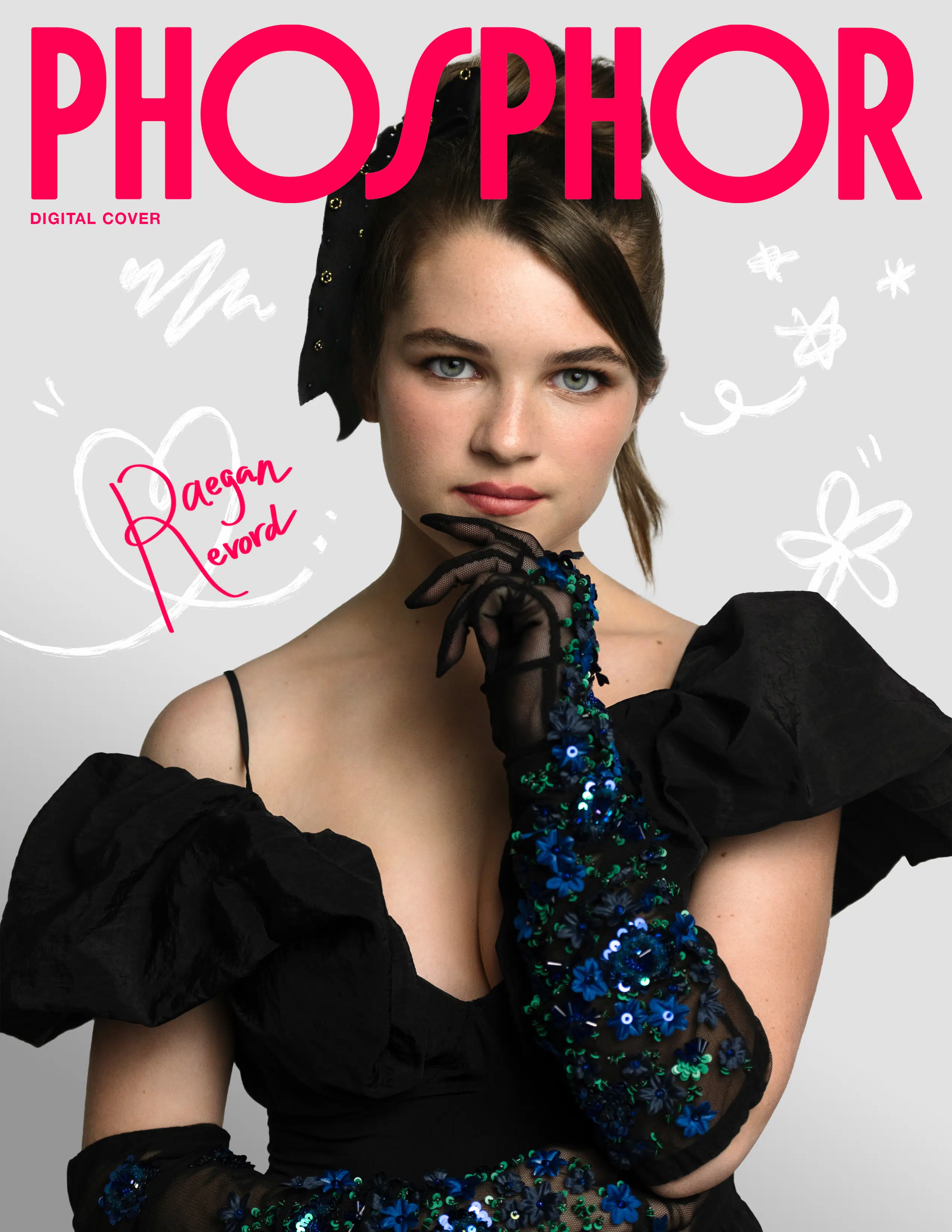



Post a comment